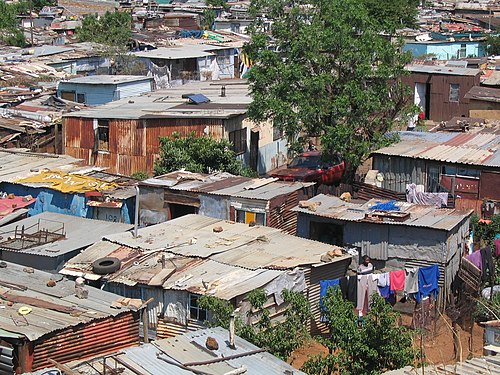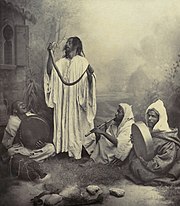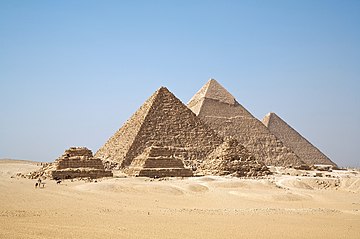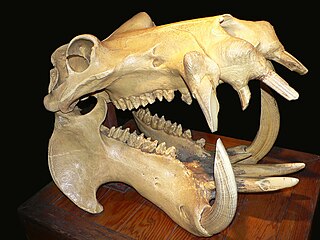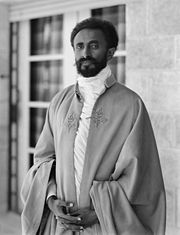Portal:Africa



Africa is the world's second-largest and second-most populous continent after Asia. At about 30.3 million km2 (11.7 million square miles) including adjacent islands, it covers 20% of Earth's land area and 6% of its total surface area. With nearly 1.4 billion people as of 2021, it accounts for about 18% of the world's human population. Africa's population is the youngest among all the continents; the median age in 2012 was 19.7, when the worldwide median age was 30.4. Based on 2024 projections, Africa's population will reach 3.8 billion people by 2099. Africa is the least wealthy inhabited continent per capita and second-least wealthy by total wealth, ahead of Oceania. Scholars have attributed this to different factors including geography, climate, corruption, colonialism, the Cold War, and neocolonialism. Despite this low concentration of wealth, recent economic expansion and a large and young population make Africa an important economic market in the broader global context. Africa has a large quantity of natural resources and food resources, including diamonds, sugar, salt, gold, iron, cobalt, uranium, copper, bauxite, silver, petroleum, natural gas, cocoa beans, and.
Africa straddles the equator and the prime meridian. It is the only continent to stretch from the northern temperate to the southern temperate zones. The majority of the continent and its countries are in the Northern Hemisphere, with a substantial portion and a number of countries in the Southern Hemisphere. Most of the continent lies in the tropics, except for a large part of Western Sahara, Algeria, Libya and Egypt, the northern tip of Mauritania, and the entire territories of Morocco, Ceuta, Melilla, and Tunisia, which in turn are located above the tropic of Cancer, in the northern temperate zone. In the other extreme of the continent, southern Namibia, southern Botswana, great parts of South Africa, the entire territories of Lesotho and Eswatini and the southern tips of Mozambique and Madagascar are located below the tropic of Capricorn, in the southern temperate zone.
Africa is highly biodiverse; it is the continent with the largest number of megafauna species, as it was least affected by the extinction of the Pleistocene megafauna. However, Africa also is heavily affected by a wide range of environmental issues, including desertification, deforestation, water scarcity, and pollution. These entrenched environmental concerns are expected to worsen as climate change impacts Africa. The UN Intergovernmental Panel on Climate Change has identified Africa as the continent most vulnerable to climate change.
The history of Africa is long, complex, and varied, and has often been under-appreciated by the global historical community. In African societies the oral word is revered, and they have generally recorded their history via oral tradition, which has led anthropologists to term them oral civilisations, contrasted with literate civilisations which pride the written word. During the colonial period, oral sources were deprecated by European historians, which gave them the impression Africa had no recorded history. African historiography became organized at the academic level in the mid-20th century, and saw a movement towards utilising oral sources in a multidisciplinary approach, culminating in the General History of Africa, edited by specialists from across the continent. (Full article...)
Selected article –
The sitatunga (Tragelaphus spekii) or marshbuck is a swamp-dwelling medium-sized antelope found throughout central Africa, centering on the Democratic Republic of the Congo, the Republic of the Congo, Cameroon, parts of Southern Sudan, Equatorial Guinea, Burundi, Ghana, Botswana, Rwanda, Zambia, Gabon, the Central African Republic, Tanzania, Uganda and Kenya. The sitatunga is mostly confined to swampy and marshy habitats. Here they occur in tall and dense vegetation as well as seasonal swamps, marshy clearings in forests, riparian thickets and mangrove swamps. (Full article...)
Featured pictures –
Did you know (auto-generated) -

- ... that in 1888, Edward P. Duplex became the first African American to be elected a mayor in California?
- ... that before the swearing-in of convicted murderer Kenny Motsamai as an MP, South African Chief Justice Mogoeng Mogoeng cited a constitutional requirement prohibiting felons from becoming MPs?
- ... that Mimi Fawaz's work includes a documentary on the life of South African president Nelson Mandela?
- ... that a 1939 thesis by Nathaniel Fadipe, The Sociology of the Yoruba, was the first sociological study by a black African?
- ... that the parliamentary sign-language interpreter could not make out what South African MP Joan Fubbs tried to say in her tribute to President Cyril Ramaphosa?
- ... that the South Australian Labor politician Ernest Roberts served two tours in South Africa during the Second Boer War?
Categories
Selected biography –
Augustine of Hippo (/ɔːˈɡʌstɪn/ aw-GUST-in, US also /ˈɔːɡəstiːn/ AW-gə-steen; Latin: Aurelius Augustinus Hipponensis; 13 November 354 – 28 August 430), also known as Saint Augustine, was a theologian and philosopher of Berber origin and the bishop of Hippo Regius in Numidia, Roman North Africa. His writings deeply influenced the development of Western philosophy and Western Christianity, and he is viewed as one of the most important Church Fathers of the Latin Church in the Patristic Period. His many important works include The City of God, On Christian Doctrine, and Confessions.
According to his contemporary, Jerome of Stridon, Augustine "established anew the ancient Faith". In his youth he was drawn to the Manichaean faith, and later to the Hellenistic philosophy of Neoplatonism. After his conversion to Christianity and baptism in 386, Augustine developed his own approach to philosophy and theology, accommodating a variety of methods and perspectives. Believing the grace of Christ was indispensable to human freedom, he helped formulate the doctrine of original sin and made significant contributions to the development of just war theory. When the Western Roman Empire began to disintegrate, Augustine imagined the Church as a spiritual City of God, distinct from the material Earthly City. The segment of the Church that adhered to the concept of the Trinity as defined by the Council of Nicaea and the Council of Constantinople closely identified with Augustine's On the Trinity. (Full article...)
Selected country –
 |
 |
|

| ||
Ethiopia (Ge'ez: ኢትዮጵያ ʾĪtyōṗṗyā), officially the Federal Democratic Republic of Ethiopia, is a country situated in the Horn of Africa that has been landlocked since the independence of Eritrea in 1993. Apart from Eritrea to the north, Ethiopia is bordered by Sudan to the west, Kenya to the south, Djibouti to the northeast, and Somalia to the east.
Ethiopia is one of the oldest nations in the world and Africa's second-most populous nation. It has yielded some of the oldest traces of humanity, making it an important area in the process of human evolution. Historically a relatively isolated mountain empire, Ethiopia has more recently become an active member of the international community. It became a member of the League of Nations in 1923, signed the Declaration by United Nations in 1942, was one of the fifty-one original members of the United Nations (UN), founded the UN headquarters in Africa, has more than 60 embassies around the world, and currently hosts the headquarters of the African Union (formerly the Organisation of African Unity), of which it was the principal founder. (Read more...)
Selected city –

Lubumbashi (former names: Élisabethville (French); 2= (Full article...)
In the news
- 12 February 2024 –
- Two boats collide on the Congo River near Kinshasa, Democratic Republic of the Congo; with the death toll remains unclear. (AP)
- 11 February 2024 – 2023 Africa Cup of Nations
- In association football, hosts Ivory Coast win their third Africa Cup of Nations by defeating Nigeria 2–1 in the final. Sébastien Haller scores the winning goal in the 81st minute. (The Guardian)
- 10 February 2024 – Somali civil war
- Four Emirati soldiers and a Bahraini military officer are killed, while ten other people are injured, when a soldier opens fire at a military base in Mogadishu, Somalia, before being killed in the ensuing shootout. Al-Shabaab claims responsibility. (AP)
- 10 February 2024 –
- A Eurocopter EC130 helicopter crashes near Nipton, California, United States, killing all the six people on board, including Nigerian banker Herbert Wigwe. (CBS News)
- 10 February 2024 – 2023–2024 Senegalese protests
- Violent protests occur in Senegal following an announcement by President Macky Sall that presidential elections have been delayed from February 25 to December 15. (Sky News)
- 9 February 2024 –
- At least 18 people are killed during a collision between a bus and a truck on a road in Kinshasa, Democratic Republic of the Congo. (AP)
Updated: 16:33, 14 February 2024
General images -
Africa topics
More did you know –
- ... that Dutch malacologist Adolph Cornelis van Bruggen is an expert in African land snails?
- ... that a 20‑day study reported by BirdLife International discovered 265 species of birds in Nki National Park?
- ... that Kalulu, an African boy who died in 1877, was modeled in Madame Tussauds and attended Dr. Livingstone's funeral in London?
- ... that Samuel Jackman Prescod became the first person of African descent elected to the Parliament of Barbados?
Related portals
Major Religions in Africa
North Africa
West Africa
Central Africa
East Africa
Southern Africa
Associated Wikimedia
The following Wikimedia Foundation sister projects provide more on this subject:
-
Commons
Free media repository -
Wikibooks
Free textbooks and manuals -
Wikidata
Free knowledge base -
Wikinews
Free-content news -
Wikiquote
Collection of quotations -
Wikisource
Free-content library -
Wikispecies
Directory of species -
Wikiversity
Free learning tools -
Wikivoyage
Free travel guide -
Wiktionary
Dictionary and thesaurus




